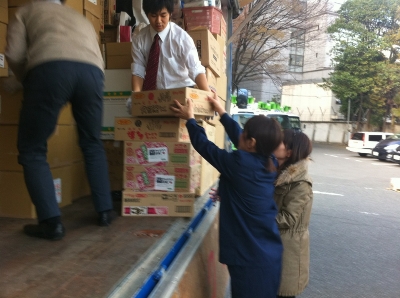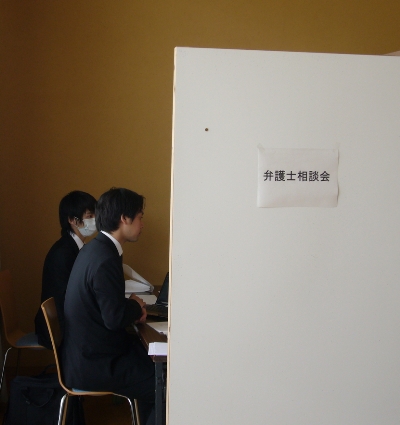Response
Student Column: Legal Counseling Service
Kosuke Mitsumoto
Second-year student, School of Law, Graduate Schools for Law and Politics
On March 27, about two weeks after the disaster, about ten of us from the law school, including myself, got together to discuss what we could do to help the affected areas recover. Each of us had different ideas about the disaster and what we could do for the victims, but we finally agreed to make contributions by using the legal knowledge we have acquired as law students.

We were asked first to give physical support, and so we helped load relief goods to be sent to Minamisoma City onto a four-ton truck.
The bar associations, law firms, our professors, and other law schools had already been conducting activities for the victims, and we were not quite sure whether we could really do anything useful in our capacity as law students. To take action at any rate, we first visited Ms. Masako Mori, who is a Liberal Democratic Party member of the House of Councilors as well as a lawyer from Fukushima Prefecture. Ms. Mori kindly introduced us to the head of the Fukushima Bar Association and we began to support the activities of both the bar association and Ms. Mori.
The bar associations of other prefectures had already begun providing legal counseling services at local evacuation centers, but in Fukushima Prefecture, the launch of such services was delayed due to the accident at the nuclear power station. On April 2, two members of our team visited Fukushima together with Ms. Mori, lawyers from the Fukushima Bar Association, and the investigation team from the Japan Federation of Bar Associations (JFBA). They first visited the evacuation center established within Big Palette Fukushima in Koriyama City and then the evacuation center established within Kamerina (the pubic gymnasium of the town of Inawashiro), providing the people there with their first legal counseling services since the disaster. Our team supported the lawyers providing the service.
With support from the JFBA, legal counseling services were then officially started at other evacuation centers in Fukushima Prefecture. We were requested to conduct surveys on the questions citizens asked legal counselors at evacuation centers or by phone and suggest appropriate answers to such questions to support the lawyers providing the counseling services. We did this and continued to conduct activities even after the new school term started. We also created a leaflet outlining the frequently asked questions and distributed it at evacuation centers.
younger generations are expected to make ongoing contributions
In addition, we supported Ms. Mori in creating a draft for a special law concerning the disaster at the nuclear power plant, incorporating the opinions of members of Fukushima’s prefectural assembly. The draft was worked on by Liberal Democratic Party members through internal discussions and consultations with representatives of other parties and on June 21 the bill on the emergency measures for the damage caused by the nuclear power station accident was submitted by members of the House of Councilors.

Many of the people we met at the evacuation centers were from coastal areas and had evacuated from their houses with nothing. They were most concerned about the safety of their families and relatives. In availing themselves of the legal counseling service, they asked a range of questions, not all of them legal in nature. The legal ones included questions about housing loans, insurance money, and the possibility of receiving workers’ accident compensation.
Although there are limits to what we can do in the capacity of students, we have been continuing our support activities despite the difficulties and adapting our responses to the changing situation. We want to make some, albeit small, contribution to the recovery of the afflicted areas. By taking action first without even knowing what we could actually do, we were able to learn a lot.
By cooperating with politicians, lawyers, government officials and others, we were able to understand the roles played by various professionals, all the more clearly because it was an emergency situation. Also, by actually engaging in legal counseling services, we were able to see how our legal studies could be practically applied to help people in real life.
The younger generations are expected to make ongoing contributions to help Japan recover from the disaster, and it was very meaningful for us to be able to engage in support activities while still students. We will continue to support the afflicted areas, although the specifics of what we will do in the future might be different from what we can do now.



